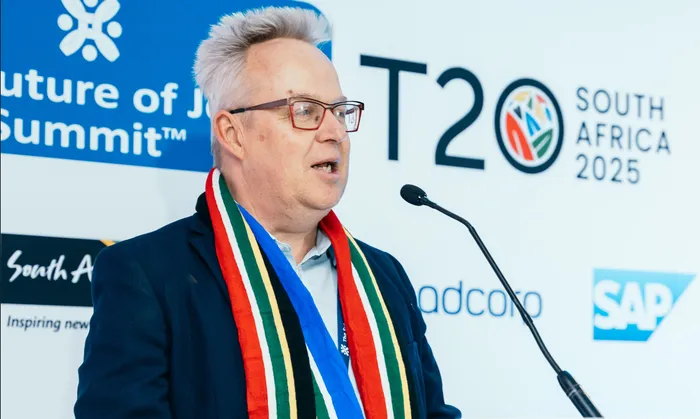Trump’s gift to South Africa: Bilateral trade, not declarations

Dr Nik Eberl is the Founder & Executive Chair: The Future of Jobs Summit™ (Official T20 Side Event) .He will be writing a regular column in Business Report.
Image: Supplied
As Johannesburg hosts world leaders for the G20 Summit this weekend, a great deal of the global chatter has focused on one headline: President Donald Trump will not attend.
Some commentators have painted this as a diplomatic setback for South Africa. Others say it weakens the credibility of a summit meant to steer the global economy. Both views miss the point.
Trump’s absence is not a loss. It is a gift. Not because of the theatrics of geopolitics, but because it forces South Africa to confront a truth shaping the global economy: the world is moving away from multilateral declarations and into a new era of bilateral trade, strategic self-interest, and deal-by-deal engagement.The countries that thrive in this environment are not those waiting for consensus in crowded multilateral rooms. They are the ones — like South Africa — bold enough to build direct commercial partnerships industry by industry, partner by partner.
And nowhere is this clearer than in our recent trade successes. South Africa is already winning — quietly, strategically, and bilaterally. Contrary to the pessimism of some analysts, South Africa is already proving that bilateral trade — not multilateral theatrics — is the engine of real growth.
We have done it with China, now our largest trading partner. We have done it with the Gulf states, particularly the UAE. And we have done it spectacularly with Spain and the broader EU — especially in citrus. This is the case study that should define South Africa’s trade confidence going into the G20.
The Citrus Disruption: How SA Beat Spain in Its Own Backyard
This year, Europe imported 752 000 tonnes of oranges from non-EU suppliers by September. South Africa supplied 78% of it. Spanish farmers — the historic powerhouse of European citrus — are watching their 400-year empire collapse. Valencia’s production has fallen 40% since 2016, and Spanish agricultural unions now warn of an “unstoppable replacement” by South African fruit.
Think about that: A country 9 000km away is out competing Spain in its own backyard. And it happened because South Africa understood the rules of the new global economy long before its critics did.
1. The Disruption Blueprint
In every global industry I’ve worked with, the same pattern emerges: traditional advantages collapse when someone rewrites the rules. Spain had proximity, heritage, and historical market dominance. South Africa had hunger — and a plan. Between 2012 and 2017, South African growers planted 10 million late-season mandarin seedlings, covering 24 000 hectares of new orchards. While Spain debated subsidies and blamed Brussels, South Africans were planting — literally — the future. This is disruption by design.
2. The Strategic Timing Play
South African citrus does not compete with Spain’s summer fruit. It fills the winter gap in Europe, when EU orchards are dormant. Early season. Late season.The market gaps Spain ignored. Smart disruption isn’t about being better. It’s about being different — and perfectly timed. When the US slapped a 30% tariff on South African citrus this year, our exporters didn’t complain. They simply redirected shipments to Europe. What looked like a crisis became a commercial conquest.
3. The Compliance Advantage
South African farmers invested R3.7 billion to meet the EU’s strict phytosanitary and cold-treatment standards. Spanish producers argue this is “unfair competition.” It is not unfair. It is commitment. While competitors lobbied Brussels, we upgraded cold chains, modernised packhouses, and trained scientists. Today, South Africa is inside the EU market fortress while others bang on the gates.
4. The Uncomfortable Truth
Spanish growers want Brussels to close the borders to South African citrus. They are filing World Trade Organiation complaints and demanding tariffs. But you cannot regulate away disruption. You cannot tariff your way back to dominance. You cannot stop a market that has already moved. South African citrus did not just win market share. It rewrote the playbook.
Why This Matters for Trump, the G20, and South Africa’s Future
The citrus story is not about agriculture. It is about the new shape of global trade. South Africa wins when:
- We act decisively.
- We negotiate bilaterally.
- We build where others defend.
- We invest while competitors hesitate.
Trump’s absence at the G20 simply underscores the futility of relying on multilateral declarations. Real growth is happening outside summit halls, in bilateral trade rooms, export councils, and supply-chain negotiations. Just as citrus producers seized market opportunity, South Africa must now replicate this mindset across:
- automotive exports
- green hydrogen
- platinum-group metals
- defence technology
- agritech
- tourism and aviation
- creative industries and sport economy
- venture capital and innovation corridors
The question is not: “Why didn’t Trump come?” The real question is: “Which new bilateral deals will South Africa secure while others are focused on optics?”
A Bilateral Future Favouring South AfricaIn this new world, South Africa has enormous leverage:
- A youthful market.
- Critical minerals essential for global reindustrialisation.
- A gateway position to Africa.
- A proven export base.
- And diplomatic flexibility unmatched by most emerging economies.
A world moving toward bilateralism is not a threat. For South Africa, it is a strategic opening. And the citrus industry has already shown what is possible when we stop waiting for permission and start competing for position.
Dr Nik Eberl is the founder and executive Chair: The Future of Jobs Summit™ (Official T20 Side Event). He is also the author: Nation of Champions: How South Africa won the World Cup of Destination Branding
*** The views expressed here do not necessarily represent those of Independent Media or IOL.
BUSINESS REPORT